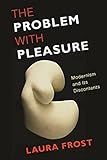The Problem with Pleasure : Modernism and Its Discontents / Laura Frost.
Material type: TextPublisher: New York, NY : Columbia University Press, [2013]Copyright date: ©2013Description: 1 online resource (304 p.)Content type:
TextPublisher: New York, NY : Columbia University Press, [2013]Copyright date: ©2013Description: 1 online resource (304 p.)Content type: - 9780231152730
- 9780231526463
- 809.9112 23
- PN56.M54 F76 2013
- PN56.M54 F76 2015
- online - DeGruyter
- Issued also in print.
| Item type | Current library | Call number | URL | Status | Notes | Barcode | |
|---|---|---|---|---|---|---|---|
 eBook
eBook
|
Biblioteca "Angelicum" Pont. Univ. S.Tommaso d'Aquino Nuvola online | online - DeGruyter (Browse shelf(Opens below)) | Online access | Not for loan (Accesso limitato) | Accesso per gli utenti autorizzati / Access for authorized users | (dgr)9780231526463 |
Browsing Biblioteca "Angelicum" Pont. Univ. S.Tommaso d'Aquino shelves, Shelving location: Nuvola online Close shelf browser (Hides shelf browser)

|

|

|

|

|

|

|
||
| online - DeGruyter Unlikely Collaboration : Gertrude Stein, Bernard Faÿ, and the Vichy Dilemma / | online - DeGruyter Unifying Hinduism : Philosophy and Identity in Indian Intellectual History / | online - DeGruyter China's Uncertain Future / | online - DeGruyter The Problem with Pleasure : Modernism and Its Discontents / | online - DeGruyter Reds at the Blackboard : Communism, Civil Rights, and the New York City Teachers Union / | online - DeGruyter Hiroshima After Iraq : Three Studies in Art and War / | online - DeGruyter Empire and Nation : Selected Essays / |
Frontmatter -- Contents -- Illustrations -- Acknowledgments -- Introduction: The Repudiation of Pleasure -- 1 James Joyce and the Scent of Modernity -- 2 Stein's Tickle -- 3 Orgasmic Discipline -- 4 Huxley's Feelies -- 5 The Impasse of Pleasure -- 6 Blondes Have More Fun -- Coda -- Notes -- Index
restricted access online access with authorization star
http://purl.org/coar/access_right/c_16ec
Aldous Huxley decried "the horrors of modern 'pleasure,'" or the proliferation of mass produced, widely accessible entertainment that could degrade or dull the mind. He and his contemporaries, including James Joyce, T. S. Eliot, Gertrude Stein, D. H. Lawrence, and Jean Rhys, sought to radically redefine pleasure, constructing arduous and indirect paths to delight through their notoriously daunting work. Laura Frost follows these experiments in the art of unpleasure, connecting modernism's signature characteristics, such as irony, allusiveness, and obscurity, to an ambitious attempt to reconfigure bliss.In The Problem with Pleasure, Frost draws upon a wide variety of materials, linking interwar amusements, such as the talkies, romance novels, the Parisian fragrance Chanel no. 5, and the exotic confection Turkish Delight, to the artistic play of Joyce, Lawrence, Stein, Rhys, and others. She considers pop cultural phenomena and the rise of celebrities such as Rudolph Valentino and Gypsy Rose Lee against contemporary sociological, scientific, and philosophical writings on leisure and desire. Throughout her study, Frost incorporates recent scholarship on material and visual culture and vernacular modernism, recasting the period's high/low, elite/popular divides and formal strategies as efforts to regulate sensual and cerebral experience. Capturing the challenging tensions between these artists' commitment to innovation and the stimulating amusements they denounced yet deployed in their writing, Frost calls attention to the central role of pleasure in shaping interwar culture.
Issued also in print.
Mode of access: Internet via World Wide Web.
In English.
Description based on online resource; title from PDF title page (publisher's Web site, viewed 02. Mrz 2022)


